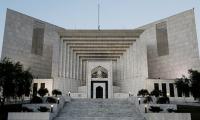ISLAMABAD: The worsening macroeconomic fundamentals and aggravating sentiments have played havoc with three major markets of Pakistan’s economy whereby markets are not ready to buy the government-sponsored narrative on economic front.
Alarmingly, three markets, including the stock market, money market, and exchange rate, are not reciprocating positively to the economic narrative being built by the economic managers, so downslide continues at an accelerated pace.
Top official sources confirmed to The News on Thursday that Prime Minister’s Adviser on Finance and Revenue Shaukat Tarin and Governor State Bank of Pakistan Dr Reza Baqir had publicly warned the commercial banks that they will take stern action if they continued exploiting the situation for offering Treasury Bills (T-bills) at higher rates.
The situation did not change on the ground mainly because the government had become desperate borrowers and commercial banks started dictating to the government on pitching higher offered rates for investing in T-bills.
The bankers knew that under the IMF agreement, the government could not borrow from the State Bank of Pakistan (SBP), so they had assumed the driving seat and dictated the government to invest in T-bills at higher rates and only in three months maturity.
If last auctions are analysed, the government raised Rs1,285 billion out of which 62.64 percent were generated for three months maturity, 29.96 percent were raised for six months and only 7.39 percent were generated for one-year period.
The government had raised a total of Rs1,285 billion against the target of Rs1,400 billion and against the maturity of Rs1,500 billion. The cut-off yields on three months, six months and one year remained unchanged at 10.79pc, 11.50pc and 11.51pc respectively. The Ministry of Finance raised Rs805 billion (almost 63 percent) through three-month treasury bills, Rs385 billion (almost 30 percent) for six months, and Rs95 billion (around 7 percent) from one-year bills.
The government became desperate borrower mainly because of flawed debt management policy, said one top official and added that the government remained conservative for making borrowings in last few months but now became desperate, so the bankers exploited the situation.
The official sources said that Pakistan’s stock market was not performing up to the mark as it seemed that foreign investors were pulling out by selling their stakes. There is a need to analyze fundamentals as well as sentiments to gauge the ground reality.
On the exchange rate, PM’s Adviser Shaukat Tarin had stated time and again the exchange rate would move two ways but it was not happening, so the one-way downslide of depreciation of rupee against dollar continued unabated. There are several reasons for dollarization; the exporters stopped their proceeds abroad while importers rushed to open up their letter of credit, so the demand-supply gap further increased pressures on the exchange rate.
Dr Khaqan Najeeb, former Adviser Finance Ministry, while talking to The News, said, “Astute policymakers must have an eye on the three key markets: PSX, money market and the exchange rate market.
“The markets may not tell the whole economic story but they do reflect sentiment and some fundamentals,” he added. Dr Khaqan explained that the KSE 100 below 44,000 and continuous profit-taking despite market PE of 5, an exchange rate moving only in one direction and hitting a record all-time low of Rs177, and a higher T bill auction of three months at 10.78pc and six months at 11.5pc, disregarding SBP’s forward guidance are all to be taken seriously.
He emphasised, “The markets have to start trusting an economic narrative at present that doesn’t seem to be the case”. In further conversation with this scribe, Dr Khaqan said that both the macroeconomic fundamentals and sentiments were aggravating the situation and some serious prescriptions were required to reverse this situation.
This scribe also contacted renowned economist Dr. Ashfaque Hassan Khan for comments on Thursday. He said that the government had become a desperate borrower, so the bankers were dictating the situation. The bankers, he said, knew that the government could not borrow from the SBP under the IMF conditions, and in order to finance a huge budget deficit, the government was left with no other option but to heavily rely upon financing from the commercial banks. The space for maneuvering for policymakers has shrunk, so dictation of banks will continue in months ahead, he added.
Khawar Manika's counsel continued his arguments on Wednesday in a petition filed by Imran Khan and Bushra Bibi
IHC reserved judgment on the petition against registration of cases against former interior minister Sheikh Rashid on...
Saudi woman who was reportedly kidnapped from Islamabad’s residential Sector F-8 in mysterious circumstances, has...
Pakistan Navy warship rescued 8 Iranian fishermen after their boat caught fire in the open sea
SC dismissed appeal against SHC order that turned down application of partner seeking extension of time to furnish...
Executive board of International Monetary Fund will meet on April 29 to discuss the approval of $1.1 billion funding...






